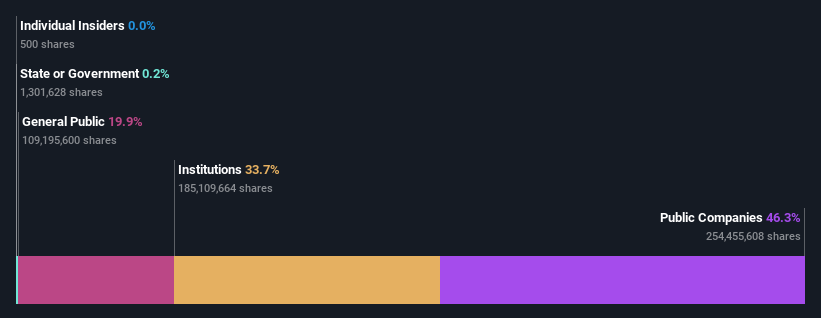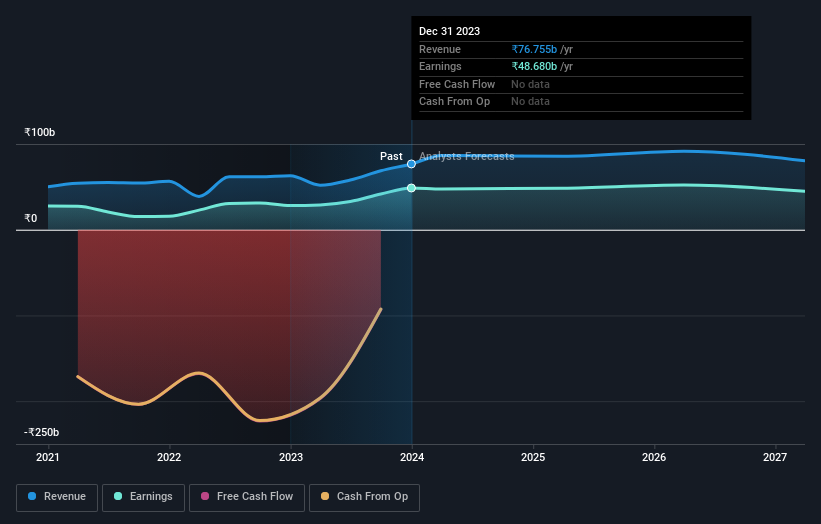Stock Analysis
- India
- /
- Diversified Financial
- /
- NSEI:LICHSGFIN
LIC Housing Finance Limited's (NSE:LICHSGFIN) top owners are public companies with 46% stake, while 34% is held by institutions

Key Insights
- Significant control over LIC Housing Finance by public companies implies that the general public has more power to influence management and governance-related decisions
- 52% of the business is held by the top 3 shareholders
- 34% of LIC Housing Finance is held by Institutions
A look at the shareholders of LIC Housing Finance Limited (NSE:LICHSGFIN) can tell us which group is most powerful. The group holding the most number of shares in the company, around 46% to be precise, is public companies. That is, the group stands to benefit the most if the stock rises (or lose the most if there is a downturn).
Institutions, on the other hand, account for 34% of the company's stockholders. Large companies usually have institutions as shareholders, and we usually see insiders owning shares in smaller companies.
Let's delve deeper into each type of owner of LIC Housing Finance, beginning with the chart below.
See our latest analysis for LIC Housing Finance

What Does The Institutional Ownership Tell Us About LIC Housing Finance?
Institutions typically measure themselves against a benchmark when reporting to their own investors, so they often become more enthusiastic about a stock once it's included in a major index. We would expect most companies to have some institutions on the register, especially if they are growing.
We can see that LIC Housing Finance does have institutional investors; and they hold a good portion of the company's stock. This suggests some credibility amongst professional investors. But we can't rely on that fact alone since institutions make bad investments sometimes, just like everyone does. When multiple institutions own a stock, there's always a risk that they are in a 'crowded trade'. When such a trade goes wrong, multiple parties may compete to sell stock fast. This risk is higher in a company without a history of growth. You can see LIC Housing Finance's historic earnings and revenue below, but keep in mind there's always more to the story.

LIC Housing Finance is not owned by hedge funds. Life Insurance Corporation of India is currently the company's largest shareholder with 45% of shares outstanding. Meanwhile, the second and third largest shareholders, hold 3.5% and 2.8%, of the shares outstanding, respectively.
To make our study more interesting, we found that the top 3 shareholders have a majority ownership in the company, meaning that they are powerful enough to influence the decisions of the company.
While studying institutional ownership for a company can add value to your research, it is also a good practice to research analyst recommendations to get a deeper understand of a stock's expected performance. There are a reasonable number of analysts covering the stock, so it might be useful to find out their aggregate view on the future.
Insider Ownership Of LIC Housing Finance
The definition of an insider can differ slightly between different countries, but members of the board of directors always count. The company management answer to the board and the latter should represent the interests of shareholders. Notably, sometimes top-level managers are on the board themselves.
I generally consider insider ownership to be a good thing. However, on some occasions it makes it more difficult for other shareholders to hold the board accountable for decisions.
Our most recent data indicates that insiders own less than 1% of LIC Housing Finance Limited. Keep in mind that it's a big company, and the insiders own ₹319k worth of shares. The absolute value might be more important than the proportional share. It is always good to see at least some insider ownership, but it might be worth checking if those insiders have been selling.
General Public Ownership
The general public-- including retail investors -- own 20% stake in the company, and hence can't easily be ignored. While this size of ownership may not be enough to sway a policy decision in their favour, they can still make a collective impact on company policies.
Public Company Ownership
We can see that public companies hold 46% of the LIC Housing Finance shares on issue. This may be a strategic interest and the two companies may have related business interests. It could be that they have de-merged. This holding is probably worth investigating further.
Next Steps:
While it is well worth considering the different groups that own a company, there are other factors that are even more important. Like risks, for instance. Every company has them, and we've spotted 2 warning signs for LIC Housing Finance (of which 1 is potentially serious!) you should know about.
If you would prefer discover what analysts are predicting in terms of future growth, do not miss this free report on analyst forecasts.
NB: Figures in this article are calculated using data from the last twelve months, which refer to the 12-month period ending on the last date of the month the financial statement is dated. This may not be consistent with full year annual report figures.
Valuation is complex, but we're helping make it simple.
Find out whether LIC Housing Finance is potentially over or undervalued by checking out our comprehensive analysis, which includes fair value estimates, risks and warnings, dividends, insider transactions and financial health.
View the Free AnalysisHave feedback on this article? Concerned about the content? Get in touch with us directly. Alternatively, email editorial-team (at) simplywallst.com.
This article by Simply Wall St is general in nature. We provide commentary based on historical data and analyst forecasts only using an unbiased methodology and our articles are not intended to be financial advice. It does not constitute a recommendation to buy or sell any stock, and does not take account of your objectives, or your financial situation. We aim to bring you long-term focused analysis driven by fundamental data. Note that our analysis may not factor in the latest price-sensitive company announcements or qualitative material. Simply Wall St has no position in any stocks mentioned.
About NSEI:LICHSGFIN
LIC Housing Finance
LIC Housing Finance Limited, a housing finance company, provides loans for the purchase, construction, repair, and renovation of houses/buildings in India.
Solid track record established dividend payer.

